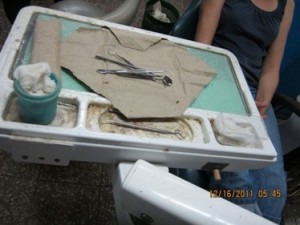
A filthy dental tray in Cienfuegos Hospital.
Photo © Christopher P. Baker.
I accompanied her to the Clínica Internacional—the foreigners-only International Clinic–Cienfuegos. Cuba’s best medical services are reserved for foreign tourists paying hard currency. This was no exception. An English-speaking doctor saw us immediately.
She identified an abcess and recommended we visit the dental ward at Cienfuegos Hospital. We were transferred in a low-tech ambulance.
The hospital’s broken windows and screens were an ill omen of worse to come: The black ring (caused by a million grubby hands) around the door handle to the dental ward, suggested it hadn’t been cleaned since the revolution.
We were admitted immediately to the ward and seated at one of a dozen stations. The first image took my breath away. I couldn’t believe my eyes. Dental instruments were sitting in a tray that hadn’t been cleaned—not even wiped!—in ages. Literally, my best guess is in months, if not years! A microscopic study might well have revealed every known bacteria under the sun. In Europe or North America, the hospital would be instantly closed as a health hazard. The travelers looked up at me with a mix of revulsion and near-panic.
What a study in contrasts…! The barebones Cubans-only pharmacies. And the foreigners-only pharmacies fully stocked with imported drugs.Fortunately, the female dentist didn’t need to place any instrument in her mouth. Instead, she looked into her mouth and instantly confirmed the abcess, then wrote a prescription for antibiotics, which the international clinic had in stock.The next day, while walking along Cienfuegos’ main shopping street (El Búlevar), the group paused to peruse the local pharmacy that serves local Cubans. I counted barely a handful of drugs (all locally produced) for sale on the sparsely stocked shelves.
What a study in contrasts…! The barebones Cubans-only pharmacies. And the foreigners-only pharmacies fully stocked with imported drugs.
The Cuban government disingenuously tells Cubans that the U.S. embargo is to blame for the critical shortage of basic medicines (although it is true that the U.S. embargo blocks sales of most U.S.-made products), reminding me of President Jimmy Carter’s admonition (presented live on Cuban TV during his visit to Cuba in January 2001) that Cuba can buy all the drugs its needs from Mexico, Brazil, etc. at prices well below those charged in the United States.
How, then, to explain the fully-stocked pharmacies serving tourists, which Cubans never get to see? Clearly, a political decision has been made to not stock the Cuban pharmacies.
Let’s hope things will soon change under his younger brother, Raúl.
Of course, Cuba has achieved some astounding things in the field of health, as I describe in detail in Moon Cuba, including
Nonetheless, Dr. Hilda Molina, founder of Havana’s International Center for Neurological Restoration, left Cuba and claims that “foreigners are assigned the highest priority, followed by government functionaries and their families, followed by athletes, then dancers, and lastly, ordinary Cuban citizens.”
Meanwhile, and more worrying, is the disparity between Cuba’s claims about the excellence of its health-care system and the shocking revelation that it doesn’t even apply standards of basic hygiene, as the photo above reveals.